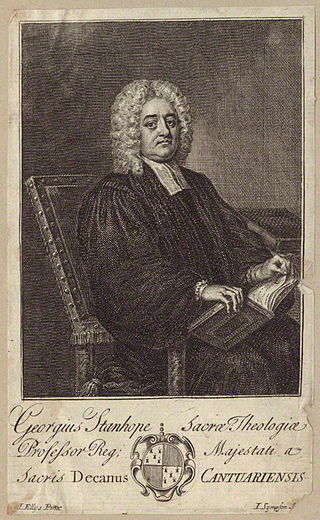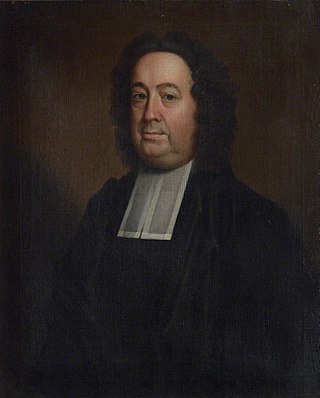Related Research Articles
The Boyle Lectures are named after Robert Boyle, a prominent natural philosopher of the 17th century and son of Richard Boyle, 1st Earl of Cork. Under the terms of his Will, Robert Boyle endowed a series of lectures or sermons which were to consider the relationship between Christianity and the new natural philosophy then emerging in European society. Since 2004, this prestigious Lectures series has been organized, with the assistance of Board of the Boyle Lectures, by the International Society for Science and Religion (ISSR) and has been held at one of its original locations, the Wren church of St Mary-le-Bow on Cheapside in the City of London.

Baron Cranworth is a title that has been created twice, both times in the Peerage of the United Kingdom. The first creation came in 1850 when the lawyer and Liberal politician Sir Robert Rolfe was made Baron Cranworth, of Cranworth in the County of Norfolk. He later served as Lord High Chancellor of Great Britain. This creation became extinct on his death in 1868.
William Burkitt was a biblical expositor, educational pioneer, rector of Milden, Suffolk, and vicar and lecturer of Dedham, Essex, in England.
Isaac Maddox was an Anglican clergyman, successively bishop of St Asaph and of Worcester.
Robert Thornhagh Gurdon, 1st Baron Cranworth, was a British Member of Parliament.

George Stanhope was a clergyman of the Church of England, rising to be Dean of Canterbury and a Royal Chaplain. He was also amongst the commissioners responsible for the building of fifty new churches in London, and a leading figure in church politics of the early 18th century. Stanhope also founded the Stanhope School in 1715.
John Gurdon was an English politician who sat in the House of Commons variously between 1640 and 1660. He supported the parliamentary cause in the English Civil War and was not returned to Parliament after the English Restoration.

Brampton Gurdon was an English country gentleman and politician who sat in the House of Commons from 1621 to 1622.

Brampton Gurdon, of Letton in Norfolk, was an English Member of Parliament (MP), lawyer and a colonel of cavalry during the English Civil War.
Brampton Gurdon may refer to:

Sir William Brampton Gurdon was a British civil servant who became a Liberal Party politician.

Thornhagh Gurdon, F.S.A. was an English antiquarian.

John Edwards (1637–1716) was an English Calvinistic divine.
Henry Gally, D.D. (1696-1769) was an English divine and classical scholar.

William Cooke (1711–1797) was an English cleric and academic, Provost of King's College, Cambridge from 1772 and Dean of Ely from 1780.

Alured Clarke (1696–1742) was Dean of Exeter between 1741 and 1742.
John Denne D.D. (1693–1767) was an English churchman and antiquarian, Archdeacon of Rochester from 1728.
Basil Kennett was a Church of England cleric who served as the first chaplain to the British Factory at Leghorn. An academic, writer and translator, Kennett was elected president of Corpus Christi College, Oxford, serving for a short time before his early death. His 1696 Romæ Antiquæ Notitia, or the Antiquities of Rome was considered the subject's standard handbook for a century.

John Whalley was an English academic at the University of Cambridge, clergyman, and poet.
References
- ↑ Chester, London Marriage Licenses, ed. Joseph Foster, col. 598; Burke, Landed Gentry , 7th ed., i. 799
- ↑ "Gurdon, Brampton (GRDN687B)". A Cambridge Alumni Database. University of Cambridge.
- ↑ Reprinted in the third volume of S. Letsome and I. Nicholl's Religion, fol. 1739. An abridgment by G. Burnet, vicar of Coggeshall, was issued in 1737, 8vo.
- ↑ Philip Morant, Essex, i. 178
- ↑ John Le Neve, Fasti, ed. Thomas Duffus Hardy, ii. 493
- ↑ George Lipscomb, Buckinghamshire, iv. 448
- ↑ James Peller Malcolm, Londinium Redivivum, iii. *468
- ↑ Gentleman's Magazine , 1741. p. 609; Administration Act Book, P.C.C., Dec. 1741
![]() This article incorporates text from a publication now in the public domain : Stephen, Leslie; Lee, Sidney, eds. (1890). "Gurdon, Brampton". Dictionary of National Biography . Vol. 23. London: Smith, Elder & Co.
This article incorporates text from a publication now in the public domain : Stephen, Leslie; Lee, Sidney, eds. (1890). "Gurdon, Brampton". Dictionary of National Biography . Vol. 23. London: Smith, Elder & Co.